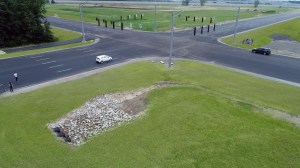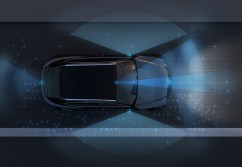Mini smart city drives research on fuel efficiency for connected autonomous vehicles

To meet future demands for enhanced fuel efficiency, an associate professor at the University of Delaware has created his own miniature smart city to test algorithms of connected autonomous vehicles (CAVs).
Andreas Malikopoulos, part of the university’s Department of Mechanical Engineering, is the leader of a three-year, $4.2 million project to research how CAVs can optimize fuel consumption using data from other vehicles and their own sensor and on-board camera data. The goal of his experiments is to slash fuel consumption of an Audi A3 E-tron by 20 percent.
“We have done several studies that have shown that there is great potential to improve the efficiency of vehicles and also in transportation using connected autonomous vehicles,” Malikopoulo says in a project demonstration video. “We’ve been able to attract graduate students, undergraduate students and high school students to get involved in the project all the way from the design concept to implementation and development.”
The project, funded by the Advanced Research Projects Agency for Energy, has two laboratories that are being used to test algorithms that manage vehicle operations.
Malikopoulos runs a facility where his team has installed six driving simulators that help represent real-world driving conditions in cities. The combination of human drivers in the simulators and virtual drivers provides Malikopoulos a test bed to study interactions between CAVs and human-operated vehicles.
In a second laboratory, the university has constructed a 1:24 scale “smart city” that spans 20 square feet where 35 mini autonomous cars execute different traffic scenarios.
The University of Delaware’s scaled smart city is “the only one of its kind and it can help us visualize how a smart city of the future would look like,” Malikopoulos said.
The simulators and scaled smart city work in tandem by allowing researchers to create algorithms through the simulators and then test them in miniature city.
“The idea is to prove concepts in this small-scale test bed, learn from this process and then move on to a real city,” Malikopoulos said, adding that the next step could be real-world testing in a city like New York.
For help with research, Malikopoulos receives support form the university’s Center for Fuel Cells and Batteries and has also partnered with the University of Michigan, Boston University, Bosch Corporation and Oak Ridge National Laboratory.






